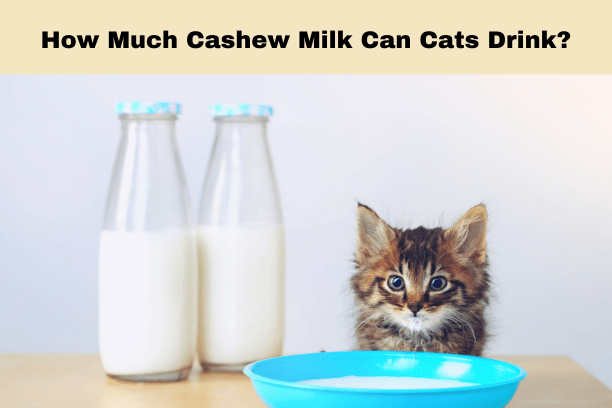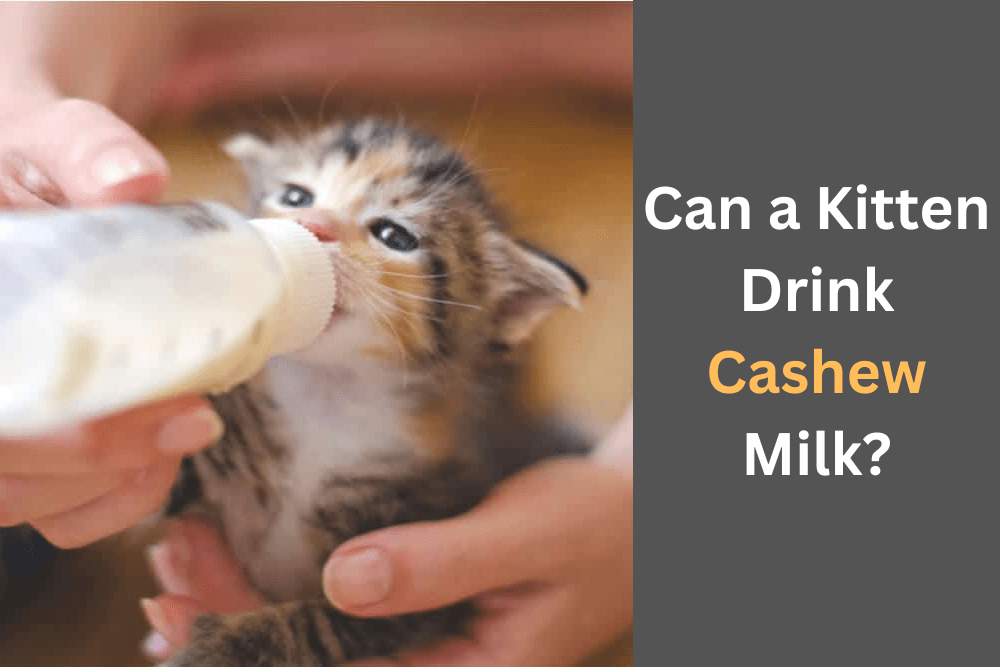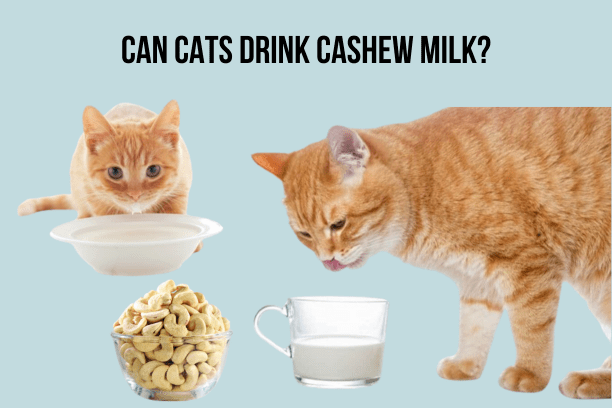If you are a cat owner, you might have wondered if you can share some of your favorite non-dairy milk with your feline friend.
Cashew milk is one of the popular plant-based alternatives to cow’s milk, but can cats drink cashew milk? is it safe and healthy for cats? In this article, we will explore the pros and cons of cashew milk for cats, and answer some common questions about this topic.
Contents
- 1 Can Cats Drink Cashew Milk?
- 2 What is Cashew Milk?
- 3 How Much Cashew Milk Can Cats Drink?
- 4 What are Some Alternatives to Cashew Milk for Cats?
- 5 Is cashews safe for cats?
- 6 Can I make cashew milk at home for my cat?
- 7 Can a kitten drink cashew milk?
- 8 Can cats eat salted cashews?
- 9 Can I give my cat almond milk instead of cashew milk?
- 10 Conclusion
- 11 FAQs: Can cats drink cashew milk?
Can Cats Drink Cashew Milk?
The short answer is yes, cats can drink cashew milk, but only in small amounts and occasionally. Cashew milk is not toxic or harmful to cats, as long as they are not allergic to nuts.
However, cashew milk is not a natural or necessary part of a cat’s diet, and it does not provide any significant nutritional benefits for them. Too much cashew milk can cause some health problems for cats, such as:
Weight gain
Cashew milk is high in calories and carbohydrates, which can contribute to obesity and diabetes in cats. Cats are carnivores, and they need a high-protein and low-carbohydrate diet to stay healthy and fit.
Digestive issues
Cashew milk can upset a cat’s stomach and cause diarrhea, vomiting, or gas. Cats have a sensitive digestive system, and they are not used to digest plant-based foods, especially nuts. Cashew milk can also interfere with the absorption of other nutrients in a cat’s diet, such as taurine, which is essential for a cat’s heart and eye health.
Allergic reactions
Some cats may be allergic to cashew nuts, or other ingredients in cashew milk, such as additives or preservatives. Allergic reactions can manifest as skin rashes, itching, swelling, or breathing difficulties. If you notice any of these signs in your cat after giving them cashew milk, you should stop immediately and consult your vet.
Related Cats Diet: Can Cats Eat White Cheddar Popcorn?
What is Cashew Milk?
Cashew milk is a creamy and delicious beverage made by blending cashew nuts with water and sometimes other ingredients, such as sweeteners, vanilla, or salt.
Cashew milk is lactose-free, gluten-free, and vegan, making it suitable for people with dietary restrictions or preferences. Cashew milk is also rich in vitamins and minerals, such as vitamin E, magnesium, iron, and zinc.
How Much Cashew Milk Can Cats Drink?
If you decide to give your cat some cashew milk, you should do it sparingly and cautiously. Start with a very small amount, such as a teaspoon, and observe your cat for any adverse reactions. If your cat seems fine, you can give them a little more, but not more than a tablespoon per day.
You should also make sure that the cashew milk you give your cat is unsweetened and unflavored, as sugar and artificial ingredients can be harmful to cats. You should also avoid giving your cat cashew milk that contains xylitol, a sugar substitute that is toxic to cats.

What are Some Alternatives to Cashew Milk for Cats?
If you want to treat your cat with something milky, some better alternatives to cashew milk are more suitable for cats. Some of these are:
Water
Water is the best and most natural drink for cats, as it keeps them hydrated and healthy. Cats need fresh and clean water every day, and you should provide them with a bowl or a fountain that they can access easily. You can also add some ice cubes or a splash of tuna juice to make the water more appealing to your cat.
Cat milk
Cat milk is a specially formulated product that is designed for cats. It is lactose-free, low in fat, and enriched with vitamins and minerals. Cat milk can be a good supplement for kittens, senior cats, or cats with health issues, as it can provide them with extra hydration and nutrition.
However, cat milk is not a substitute for a balanced diet, and you should only give it to your cat as an occasional treat, following the instructions on the package.
Goat milk
Goat milk is another option that some cat owners swear by. Goat milk is lower in lactose than cow’s milk, and it contains beneficial enzymes and probiotics that can help a cat’s digestion. Goat milk is also high in protein, calcium, and other nutrients that can support a cat’s health.
However, goat milk is still not a natural food for cats, and it can cause some of the same problems as cashew milk, such as weight gain, digestive issues, or allergic reactions. Therefore, you should only give your cat goat milk in moderation, preferably raw or fermented, as pasteurized goat milk can lose some of its beneficial properties.
Is cashews safe for cats?
Cashew is a type of nut that is often used to make cashew milk, a plant-based alternative to dairy milk. Cashews are not toxic or harmful to cats, as long as they are not allergic to nuts.
However, cashew is not a natural or necessary food for cats, and it can cause some health problems for them if they consume too much. Cashews are high in calories, carbohydrates, and fat, which can lead to obesity and diabetes in cats.
Cashews can also upset a cat’s stomach and cause digestive issues, such as diarrhea, vomiting, or gas. Cashews can also interfere with the absorption of other nutrients in a cat’s diet, such as taurine, which is essential for a cat’s heart and eye health. Therefore, cashew is not a safe food for cats, and it should be avoided or given only in very small amounts and occasionally.
Can I make cashew milk at home for my cat?
Cashew milk is a beverage made by blending cashew nuts with water and sometimes other ingredients, such as sweeteners, vanilla, or salt. Cashew milk is lactose-free, gluten-free, and vegan, making it suitable for people with dietary restrictions or preferences.
However, cashew milk is not a suitable drink for cats, and it does not provide any significant nutritional benefits for them. Cashew milk can cause some of the same health problems as cashew nuts, such as weight gain, digestive issues, or allergic reactions.
Therefore, making cashew milk at home for your cat is not a good idea, and you should not give your cat cashew milk, whether homemade or store-bought.
Can a kitten drink cashew milk?
The kitten is a young cat that is still growing and developing. Kitten needs a lot of protein, calcium, and other nutrients to support their growth and health. Kitten also needs a lot of water to stay hydrated and prevent urinary tract infections.
Cashew milk is not a good source of protein, calcium, or water for kittens, and it can cause some of the same health problems as cashew nuts, such as weight gain, digestive issues, or allergic reactions. Therefore, kittens should not drink cashew milk, and they should only drink water or cat milk, which is a specially formulated product that is designed for cats. Cat milk is lactose-free, low in fat, and enriched with vitamins and minerals.
Cat milk can be a good supplement for kittens, but it should not replace a balanced diet, and it should only be given as an occasional treat, following the instructions on the package.

Can cats eat salted cashews?
Salted cashews are cashew nuts that have been roasted and seasoned with salt. Salted cashews are a tasty snack for humans, but they are not a healthy or safe snack for cats.
Salted cashews have all the drawbacks of cashew nuts, such as high calories, carbohydrates, and fat, which can lead to obesity and diabetes in cats. Salted cashews also have the added problem of salt, which can be harmful to cats. Salt can cause dehydration, high blood pressure, and kidney damage in cats.
Salt can also make cats thirsty, which can make them drink more water or other liquids, such as cashew milk, which can worsen their health problems. Therefore, cats should not eat salted cashews, and they should only eat cat food or cat treats that are appropriate for their age, size, and health condition.
Can I give my cat almond milk instead of cashew milk?
Almond milk is another plant-based alternative to dairy milk, made by blending almonds with water and sometimes other ingredients, such as sweeteners, vanilla, or salt.
Almond milk is lactose-free, gluten-free, and vegan, making it suitable for people with dietary restrictions or preferences. However, almond milk is not a suitable drink for cats, and it does not provide any significant nutritional benefits for them.
Almond milk can cause some of the same health problems as cashew milk, such as weight gain, digestive issues, or allergic reactions. Almond milk can also contain xylitol, a sugar substitute that is toxic to cats. Therefore, giving your cat almond milk instead of cashew milk is not a better option, and you should not give your cat any type of non-dairy milk, whether homemade or store-bought.
Conclusion
Cashew milk is a tasty and healthy drink for humans, but not so much for cats. Can cats drink cashew milk? Yes, cats can drink cashew milk, but only in small amounts and occasionally, as it can cause some health problems for them.
Cashew milk is not a natural or necessary part of a cat’s diet, and it does not provide any significant nutritional benefits for them. If you want to treat your cat with something milky, some better alternatives to cashew milk are more suitable for cats, such as water, cat milk, or goat milk.
However, you should always consult your vet before introducing any new food or drink to your cat, and monitor your cat for any adverse reactions.
FAQs: Can cats drink cashew milk?
Q: Is cashew milk good for cats?
- A: No, cashew milk is not good for cats. Cashew milk is a plant-based drink that does not provide any significant nutritional benefits for cats. Cats are carnivores, and they need a high-protein and low-carbohydrate diet to stay healthy and fit. Cashew milk is high in calories, carbohydrates, and fat, which can lead to obesity and diabetes in cats. Cashew milk can also upset a cat’s stomach and cause digestive issues, such as diarrhea, vomiting, or gas. Cashew milk can also interfere with the absorption of other nutrients in a cat’s diet, such as taurine, which is essential for a cat’s heart and eye health. Therefore, cashew milk is not a good drink for cats, and it should be avoided or given only in very small amounts and occasionally.
Q: Can cashew milk cause allergic reactions in cats?
- A: Yes, cashew milk can cause allergic reactions in cats. Cashew milk is made from cashew nuts, which are a type of nut that some cats may be allergic to. Allergic reactions can manifest as skin rashes, itching, swelling, or breathing difficulties. If you notice any of these signs in your cat after giving them cashew milk, you should stop immediately and consult your vet. You should also avoid giving your cat cashew milk that contains other ingredients, such as additives, preservatives, sweeteners, vanilla, or salt, as these can also trigger allergic reactions in cats.
Q: What are some alternatives to cashew milk for cats?
- A: If you want to treat your cat with something milky, some better alternatives to cashew milk are more suitable for cats. Some of these are:
- Water: Water is the best and most natural drink for cats, as it keeps them hydrated and healthy. Cats need fresh and clean water every day, and you should provide them with a bowl or a fountain that they can access easily. You can also add some ice cubes or a splash of tuna juice to make the water more appealing to your cat.
- Cat milk: Cat milk is a specially formulated product that is designed for cats. It is lactose-free, low in fat, and enriched with vitamins and minerals. Cat milk can be a good supplement for kittens, senior cats, or cats with health issues, as it can provide them with extra hydration and nutrition. However, cat milk is not a substitute for a balanced diet, and you should only give it to your cat as an occasional treat, following the instructions on the package.
- Goat milk: Goat milk is another option that some cat owners swear by. Goat milk is lower in lactose than cow’s milk, and it contains beneficial enzymes and probiotics that can help a cat’s digestion. Goat milk is also high in protein, calcium, and other nutrients that can support a cat’s health. However, goat milk is still not a natural food for cats, and it can cause some of the same problems as cashew milk, such as weight gain, digestive issues, or allergic reactions. Therefore, you should only give your cat goat milk in moderation, preferably raw or fermented, as pasteurized goat milk can lose some of its beneficial properties.




